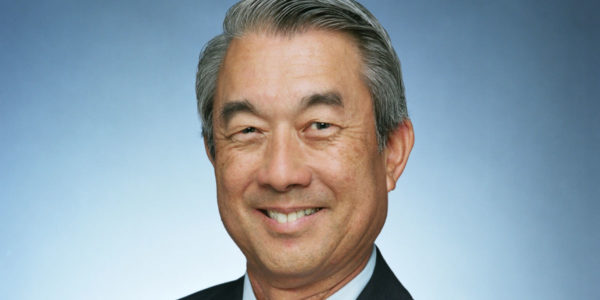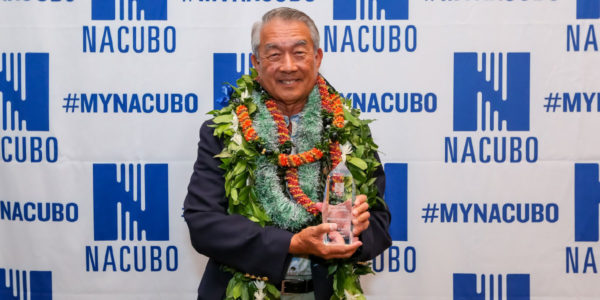
During my nearly 50 years at the University of Hawaii I have certainly learned a lot, from the machinations of a large university system to the nuances of the budget processes and even to how the legislature operates. I’ve learned especially about how to get along and work with people—which is perhaps the most essential aspect of any job.
After all, it’s not just the responsibilities and experiences of a job that make it meaningful. It’s about understanding people and building relationships you can depend on. It is about mutual regard and the realization that each person is important to every other person in the pursuit of a collective goal or good. In essence, it is the Aloha Spirit—that singular and characteristic Hawaiian idea encompassing kindness, unity, agreeableness, humility, and patience—that animates my work and the work of my colleagues and serves as a reminder that we are all each other’s most precious resource.
Two Roads, All the Difference
When I graduated from the University of Hawaii in 1968 with a bachelor’s degree in business administration, I wanted to pursue graduate work at Indiana University, Bloomington, but I ended up entering the Air National Guard because of the ongoing war in Vietnam. While this meant I had to stay in Hawaii, I was really very fortunate because I was still able to continue my education. With a job at the University of Hawaii that paid me $500 a month, I was able to keep up my educational momentum and earn an MBA from the University of Hawaii in 1970—and I’ve essentially stayed at the university ever since.
One of my first professional roles at the institution was in the management systems office doing statistical work, after which I was a finance officer at the East West Center. Eventually I faced a turning point when I was offered two different positions at the university. One would have been a promotion to an executive-level position, while the other was a lateral move to the budget office. I chose the budget office position to learn more about budgetary and financial management at the university and, in retrospect, I’m so fortunate I did.
The University of Hawaii System is made up of 10 campuses across four major islands and includes three universities, with one research campus and two regional baccalaureate campuses; seven community colleges; and several community-based learning centers that facilitate distance learning, continuing education, and professional development. It is a sprawling enterprise that requires many skills of its leadership, not the least of which are an understanding about and respect for each component.
Prior to working in the budget office, I had been in administrative positions throughout my career. While the work was interesting, it didn’t grant me any real insight into how the university functioned. The four years I spent in the budget office were simply the best of my career in terms of learning. I got to understand policies and procedures in all aspects of administration as well as the larger body of university personnel and its inner workings. Becoming acquainted with so many people at all levels of the university administration fostered in me the respect and understanding I would need when I eventually assumed a leadership role. More practically, my time in the budget office equipped me with all the connections I needed to pursue answers to my questions and ultimately get things done. I credit what I learned in those four years in large part with getting me to where I am today in my career.
Expanding Professional Networks
I had always wanted to experience the community college sector of the University of Hawaii, and in 1980 I got my chance as director of administrative services at Leeward Community College, Pearl City. I’ve been with the community colleges ever since then, at Leeward until 1993 and then as associate vice president for administrative affairs for the University of Hawaii Community College System.
While I was at Leeward, I began to get involved with WACUBO and NACUBO, thanks in large part to mentors who encouraged me to explore new and different opportunities and grow as a professional. Out here in the middle of the Pacific, there aren’t many chances for professional development. Becoming part of the WACUBO and NACUBO networks broadened my perspective by showing me how other universities operate and how other business office professionals manage and lead. The information and insights I have gained from working with my professional colleagues have been invaluable to my career and my ability to help our university.
Those of us who work at the university’s community colleges are actually quite fortunate because we enjoy a positive reputation within the larger university system and with our state legislators. In Hawaii, the state legislature provides the bulk of the funding for each of our campuses, especially the community colleges. We are considered to be administratively well-organized and well-run. Academically, we provide the education and training for a growing and ever-changing workforce, and we are able to adjust our curriculum quickly to meet these workforce demands. Our legislators understand the importance and the value of our open-access, affordable tuition philosophy and expect us to provide the state with a well-trained workforce. Engaging in professional development has definitely helped me deliver on these commitments.
The Mentoring Equilibrium
As with any career as long as mine has been, I’ve experienced many pivotal moments. But the ones that are top of mind even after all these years are those moments when colleagues and associates stepped up and stepped forward to mentor me, guide me, and give me the advice that ultimately shaped how I saw myself and the type of leader I wanted to be.
I became a member of the NACUBO board very early in my career, working with other board members from major universities throughout the United States, the majority of whom were at the vice president and CFO levels. I was still director of administrative services at Leeward Community College and didn’t exactly see myself as being in the same league as my fellow board members. In all honesty, it was rather intimidating. I mean, I was still learning how to tie a tie.
I am still so thankful that at one of our meetings Anthony Lazzaro, senior vice president emeritus of the University of Southern California, Los Angeles, pulled me aside and counseled me. He said, "Mike, don’t let these guys intimidate you. Just be yourself." That was a crucial turning point for me. It gave me permission to see myself more maturely and gave me the confidence to know that I didn’t have to be looking up at anybody—that all of us in that room were equals. All I had to do was be myself and bring that Aloha Spirit we have in Hawaii to Washington, D.C. It is amazing to me that so few words from Tony meant so much to me at the time and have continued to have such an impact on the way I see myself.
Another person who impacted how I saw myself, this time as a leader and manager, was my secretary, whom I had worked with early on in my career. We would have discussions about intra-office dynamics and how people’s behaviors were making me feel. She really opened my eyes when she reminded me that I wasn’t running a popularity contest. I wasn’t going to be liked by everyone, so the best thing I could do was to deal objectively with issues that arose. Not all experiences are going to be good experiences, especially when dealing with personnel. But by working with people and approaching issues fairly and objectively, I would be able to demonstrate the respect we all deserved.
In my current position, I try to share my experiences and insights with my colleagues and provide mentorship whenever possible. I have found that the more I share with my colleagues and mentor my staff—by building trust and rapport with one another—the easier everyone’s job becomes. It has always been my philosophy that my staff and colleagues are more important than I am. They can do their jobs without me, but I cannot do my job without their support; I depend on them. None of us is above the rest or more important than anyone else. That’s the essence of "managing with aloha!"
Mutual Mahalo
In Hawaii, to express our gratitude, we say, "mahalo." I’ve been in my current position for 26 years, and during that time I’ve been fortunate to have been able to surround myself with a wonderful staff of eight who report directly to me. I say a big "mahalo" every day for such a dependable team, which also includes those committed professionals who report to my immediate staff.
Whether we have a professional issue or a personal issue, we are all invested in being able to sit down together and have a frank and respectful discussion that will get us to a solution.
One of the pinnacles of my career came in 2009, when I was selected as the State of Hawaii Manager of the Year. The award recognizes exceptional leadership and was especially meaningful for me because I was nominated by the people I work with. Their recognition and the privilege of representing them and all our many collective accomplishments was, and still is, a source of great pride for me.
Family Matters
One does not achieve success without the support of family. My parents were second-generation immigrants from Japan. Neither of them got further than an eighth-grade education, and they struggled to support the family financially. There is a Japanese saying, "kodomo no tame ni," that means "for the sake of the children." My parents sacrificed everything they had so that my brother and I had the best opportunity for a successful life and did not have to struggle as they did. They devoted their entire lives to ensuring that we had opportunities for a college education. I also credit my wife, our son and daughter, and our four grandchildren with allowing me to participate in the many meaningful professional activities that have taken me away from home. I could not have accomplished what I have without the support of my family.
I doubt it comes as a surprise to anyone that I’ve been eligible for retirement for some years now, and I look back on my long career in higher education with gratitude. When people ask me why I haven’t decided to retire yet, I just tell them the truth: The people I work with keep me going and, frankly, I’m just enjoying my job too much.
MIKE UNEBASAMI is associate vice president for administrative affairs, the University of Hawaii Community College System.


